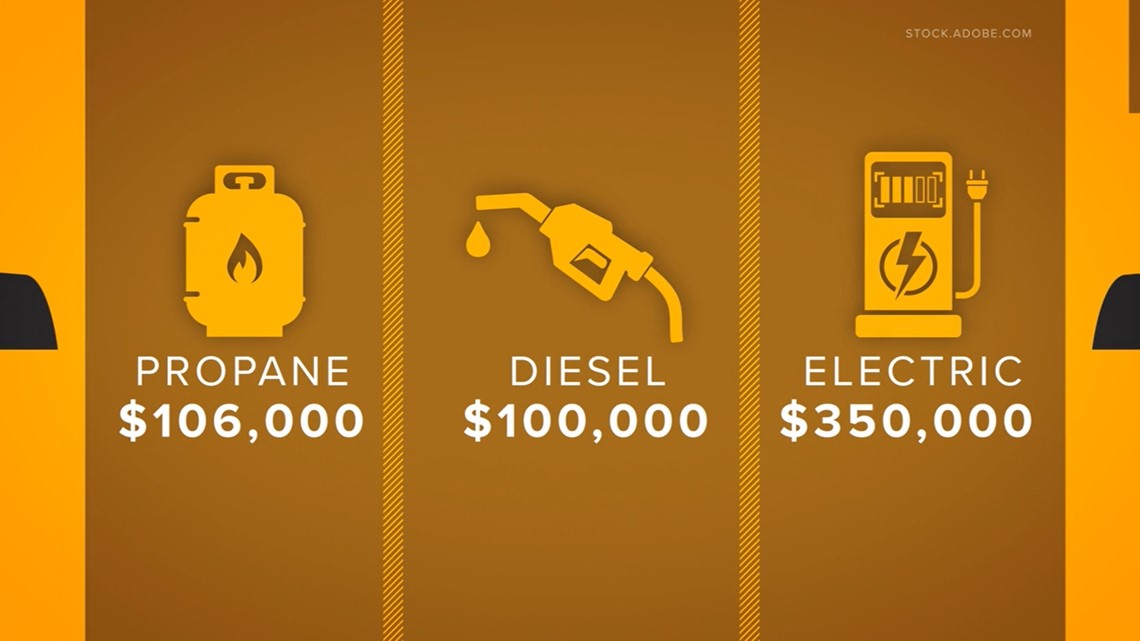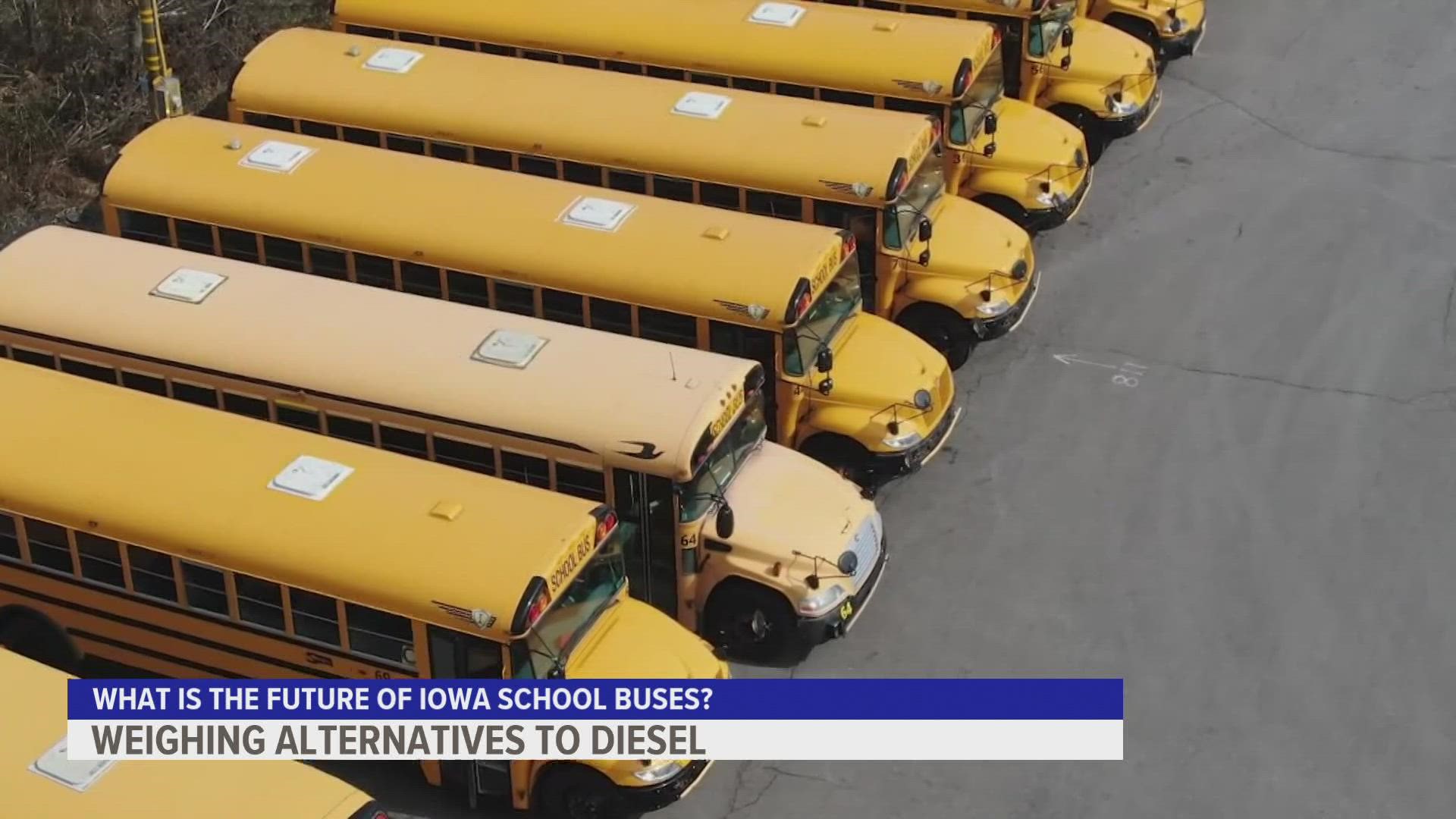DES MOINES, Iowa — While only 3% of vehicles on roads across the country run on diesel, their exhaust accounts for over a quarter of the nation's transportation greenhouse gas emissions.
Research shows school buses nationwide emit up to 8.4 million metric tons of carbon dioxide each year.
That is roughly equivalent to the carbon dioxide produced by a single vehicle driven more than 21 million miles.
In light of these statistics, there is a growing demand to consider eco-friendly alternative options to school buses, which traditionally run on diesel.
Switching to diesel substitutes is a goal for some school districts in Iowa, but flipping the state's fleet of nearly 3,000 school buses won't happen overnight.
“I think we can all agree that we want cleaner air for children, for vulnerable people, for everybody,” said Karin Stein, Iowa Organizer for Moms Clean Air Force.
About 250,000 Iowa students ride the bus to and from school every day. In recent years, some schools in the state have transitioned to a cleaner fuel: propane.
More specifically, 322 school buses in 56 Iowa school districts are powered by propane.
“It's a clean fuel, a byproduct of natural gas," said Deb Grooms, CEO of the Iowa Propane Gas Association. "It doesn't leak into the ground and evaporate, so it is a great fuel.”
A 2019 West Virginia University study showed nitrous oxide emissions were 34 times higher for diesel school buses over propane buses on stop-and-go routes, pointing to the benefits of using propane compared to diesel.
The Nevada Community School District added propane buses to its fleet four years ago and plans to add more in the future.
“It is so smooth and quiet," said Jason Sampson, Director of Transportation for the Nevada Community School District. "It does make some noise when you accelerate, but nothing compared to what a diesel bus does.”
One of the primary reasons for the upgrade is the amount of money saved in fuel and maintenance over time.
“You do pay just a little bit more than a diesel bus, but in the long run you save close to $30,000 per unit,” said Sampson.


New propane buses cost roughly $106,000 upfront, slightly more than the current price of a diesel bus.
Electric buses are another alternative to diesel, but at a cost of around $350,000, they are more than triple what districts are budgeting for new buses now.
Currently in Iowa, electric buses are only used by public transit services like the Des Moines Area Regional Transit Authority (DART).
Through a Federal Transit Administration grant and a partnership with MidAmerican Energy, DART was able to launch a pilot fleet of seven electric buses at the beginning of the year.
“We know that diesel buses are not going to be the future of the transit vehicle," said Erin Hockman, Chief External Affairs Officer for DART. "We really wanted to be on the forefront of testing new technologies and understanding what is going to work best here in our area and our climate in particular."
DART is using the pilot project as an opportunity to assess the potential savings electric can provide.
“We're looking at everything from maintenance on the buses to what energy source cost whether it be diesel or electric,” said Keith Welch, Fleet Manager for DART.
Electric transit buses run just shy of $900,000.
Costs for charging stations and electrical infrastructure to host these vehicles add to the final price as well.
As improvements to electric buses come about, the hope is the cost will eventually drop to a more affordable range for public transit organizations and school districts alike.
“I could see more school buses doing it with the capacities that they're coming out with," Welch said. "They get that battery technology in there in the next few years, that can be the biggest game-changer."
Another possible game-changer could be the recently signed bipartisan Infrastructure and Investment Jobs Act, which sets aside $5 billion for new school buses.
Half the funding is set aside for new electric school buses and half for low-emission school buses.
"We are grateful because it is the biggest step in that direction that we have seen," Karin Stein told Local 5. "I know that some Iowa school districts are interested in electrifying."
Currently, there are no school districts in Iowa with electric buses as part of their fleet.
However, the Iowa City Community School District is the first in the state to pledge to convert to all electric buses. They plan to complete this process over the next 11 years.
Schools that don’t get federal aid will have to weigh the pros and cons of electric versus propane.
“I keep my eye on it," Sampson said. "If someday that ever becomes an affordable option for the school district then yeah, I would absolutely jump all over it.”
Moms Clean Air Force urges schools to look at the big picture rather than just the upfront costs, and encourages them to apply for federal aid made available through the Infrastructure and Investment Jobs Act.
“We cannot afford not to do these things," Stein said. "We cannot afford not to fight the climate because the cost of not doing so far outweighs the cost of whatever we're saving short term.”
Related Stories
WATCH | The future is electric: Iowa's efforts in transportation (Full Special)

